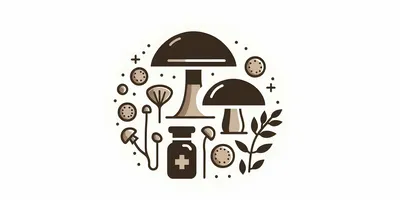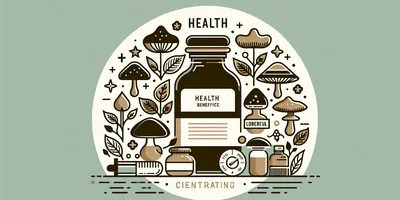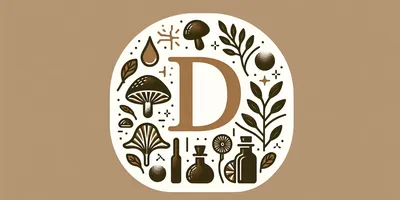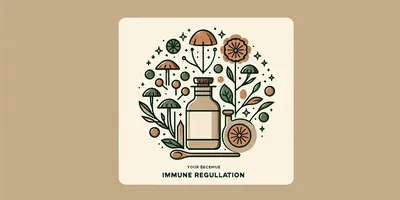pink oyster mushroom Benefits (Pleurotus djamor)
pink oyster mushroom (Pleurotus djamor) is an edible mushroom and medicinal mushroom.

Enhances Gut Health
The pink oyster mushroom is significant in promoting gut health, primarily through its role in enhancing prebiotic properties when used in fermentation processes. Prebiotics are compounds that induce the growth or activity of beneficial microorganisms such as bacteria and fungi that contribute to well-being. A fascinating instance of this is observed in the study where Riceberry rice underwent germination and subsequent fermentation with Pleurotus ostreatus mycelium, highlighting the mushroom's impactful prebiotic potential.
Detailed research found that the germination process of Riceberry rice significantly increased the content of γ-aminobutyric acid (GABA), an important neurotransmitter that can also influence gut health. The introduction of pink oyster mushroom mycelium during fermentation further enhanced these properties, syncing optimally with the three-day fermentation period to raise β-glucan concentration while maintaining GABA levels. The fermented product notably outperformed commercial prebiotics such as inulin and β-glucan in supporting the growth of gut-friendly bacteria, including Pediococcus sp. and Streptococcus lactis.
These improved prebiotic activities are particularly beneficial for digestive health, suggesting that incorporating pink oyster mushrooms into our diet, or utilizing its fermentation capabilities in food processing, could contribute to a better-balanced gut microflora. This has far-reaching implications for not only the general population but could be especially advantageous for the dietary needs of the elderly, who often face digestive challenges. The introduction of pink oyster mushroom-fermented products could thus pave the way for innovative, nutritionally enriched, and gut health-promoting food options.
Learn about mushrooms with gut health benefits.

Antidepressant Benefits
Research in the field of psychopharmacology has uncovered noteworthy results related to pink oyster mushroom, showing promising potential as a natural antidepressant. A particular study explored the effects of ethanolic extracts from a related species of oyster mushroom on mood disorders. The findings revealed that the extracts exhibited significant antidepressant and sedative qualities. Evaluating the antidepressant potential, the study utilized behavioral tests such as the tail suspension test (TST) and the forced swim test (FST) in Wistar rats affected by reserpine-induced depression.
The use of these tests is crucial as they are reliable indicators of antidepressant activity; a reduction in the immobility time during these tests is indicative of an antidepressant effect. The pink oyster mushroom extract led to a noticeable decline in immobility time among the subjects. Furthermore, it positively modulated neurotransmitter levels and enhanced the body's antioxidant enzyme activity, while also reducing oxidative stress—indicated by a decrease in malondialdehyde (MDA) levels. This dual-action of mood improvement and neuroprotection suggests the mushroom's therapeutic benefits for neurodegenerative conditions that are commonly associated with increased oxidative stress.
The implications of these findings are substantial, as they suggest that pink oyster mushroom could serve as a natural alternative to conventional antidepressant medications, offering a safety profile that is generally well-tolerated by the body. This opens up avenues for future clinical research to further understand its efficacy in treating depressive disorders.
Learn about mushrooms with antidepressant benefits.

Anti-inflammatory Benefits
The pink oyster mushroom has been linked to significant anti-inflammatory effects, which play a crucial role in countering inflammation-related health issues. A study showcased that extracts from oyster mushrooms were able to suppress the secretion of pro-inflammatory cytokines such as TNF-alpha and IL-6, by inhibiting important signaling pathways involved in the inflammatory response.
These findings are complemented by a randomized controlled trial on a related species of oyster mushroom, which demonstrated reduced levels of IL-6, an inflammatory marker, along with other health improvements in individuals with metabolic disorders. Regular consumption of the mushrooms led to a decrease in inflammation, showcasing their potential for dietary management of inflammation-related conditions.
Further supporting these results, an extensive review on fungal feed additives highlighted the anti-inflammatory properties of fungal components, including those found in various edible mushrooms. These components contribute to the overall health and wellness of animals, suggesting similar benefits could be translated to human health when included in the diet.
Additionally, research into the health benefits and biochemistry of edible mushrooms further justifies the therapeutic use of pink oyster mushrooms. The paper highlights the rich composition of bioactive compounds in mushrooms that act as anti-inflammatory agents, offering nutritional and potential medicinal advantages from routine consumption.
Learn about mushrooms with anti-inflammatory benefits.

Rich in Antioxidants
The pink oyster mushroom is celebrated for its abundance of antioxidants, substances that can prevent or slow damage to cells caused by free radicals. These beneficial compounds are crucial for maintaining health and protecting against a multitude of diseases.
Research elucidates that this mushroom contains several bioactive compounds with antioxidant properties, such as polysaccharides, which contribute to its health-promoting effects. A study highlighted in The Edible Mushroom Pleurotus spp.: I. Biodiversity and Nutritional Values discusses the antioxidant activities present in Pleurotus extracts, making this mushroom a potential ally against oxidative stress[source].
Furthermore, other research demonstrated that the metabolomic profile of the pink oyster mushroom, cultivated on different agri-food byproducts, revealed a rich presence of phenolic and flavonoid compounds. These are known for their intrinsic scavenging/reducing properties, suggesting the mushroom's powerful antioxidant capabilities and potential for use in food supplements[source].
The antioxidant properties of the pink oyster mushroom do not end there. A study on Pleurotus columbinus, a close relative, reinforces these findings, showing that different growth substrates affect its metabolomic profile, including antioxidant compounds. The observed variations in its biological activities affirm the versatility and health benefits of these mushrooms[source].
Incorporating pink oyster mushroom into one’s diet could help bolster the body's defense system against oxidative stress, potentially reducing the risk of chronic diseases and promoting overall well-being. This edible fungus is not only a delicious culinary ingredient but also a functional food with a rich antioxidant profile[source].
Learn about mushrooms with antioxidant benefits.

Antimicrobial Benefits
Pink oyster mushrooms have been shown to possess significant antimicrobial properties that could make them a valuable ally in the fight against infections. A study titled "Metabolomic Profiling and Biological Activities of Pleurotus columbinus Quél. Cultivated on Different Agri-Food Byproducts" identified 97 metabolites within the mushroom, revealing that its content of carbohydrates, amino acids, and phenolic compounds varied based on the growth substrate. These variations contributed to the mushroom's intrinsic antimicrobial effects against various bacterial and fungal pathogens, including E. coli, Tricophyton, and Aspergillus.
Another comprehensive review, "The Effect of Edible Mushroom on Health and Their Biochemistry," highlights the range of bioactive compounds present in mushrooms like the pink oyster, which contribute to their preventative and medicinal properties. The documented therapeutic effects include acting as immunomodulatory, anticarcinogenic, antiviral, and anti-inflammatory agents, with potential for pharmaceutical applications.
Further emphasizing the antimicrobial potential, research conducted by Madhanraj et al. in "Evaluation of anti-microbial and anti-haemolytic activity of edible basidiomycetes mushroom fungi," explored various extracts from Basidiomycetes mushrooms, finding that the hexane extract of Pleurotus pulmonarius, a close relative of the pink oyster mushroom, showed promising antimicrobial and antihaemolytic activities. This suggests that edible mushrooms, including pink oyster mushrooms, could serve as natural and safe alternatives to traditional antibiotics, potentially addressing the growing concerns around drug resistance.
Learn about mushrooms with antimicrobial benefits.

Nutritional Benefits
The pink oyster mushroom is not just a culinary delight but also a nutritional powerhouse. It's rich in important compounds that are crucial for maintaining a balanced diet and supporting overall health. For instance, the unique process of fermentation with pink oyster mushroom has been shown to enhance the prebiotic properties of germinated Riceberry rice.
This means that incorporation of pink oyster mushroom into foods can potentially improve gut health. By boosting the levels of γ-aminobutyric acid (GABA) and β-glucan through a unique fermentation process, the mushroom promotes the growth of beneficial gut bacteria such as Pediococcus sp. and Streptococcus lactis. Not only does this support digestive health, but it is also particularly beneficial for the elderly, contributing positively to their nutritional intake and gut flora balance.
Moreover, these enhancements make the pink oyster mushroom a promising ingredient for rice-based products, adding not just flavor but also increasing their nutritional value and functionality as a prebiotic food source. Therefore, leveraging the natural properties of this mushroom can lead to innovative ways to improve diet and health, especially in populations that may be prone to digestive issues.
Learn about mushrooms with nutrition benefits.

Supports Brain Health
Pink oyster mushrooms are not just an excellent addition to a meal for their vibrant color and rich flavor, but they are also heralded for their potential cognitive benefits. These mushrooms are a source of bioactive compounds that could play a role in promoting brain health. As studies illustrate, Ayurvedic traditions, which have long valued the brain health properties of various plants, also resonate with findings on mushrooms like the pink oyster variety.
Edible mushrooms, including pink oyster mushrooms, contain an array of vitamins, minerals, and antioxidants, which are integral to brain health. Specifically, molecules such as phenolic compounds found in these mushrooms have been linked to neuroprotective effects. The implications of these findings are vast, ranging from mitigating oxidative stress to possibly lowering the risk of neurodegenerative diseases. Through their antioxidant actions, mushrooms like the pink oyster could be a dietary ally in maintaining cognitive function and overall brain health, as discussed in The Effect of Edible Mushroom on Health and Their Biochemistry.
Moreover, mushrooms' anti-inflammatory properties are also essential since chronic inflammation is a known factor in the development of cognitive decline. Hence, incorporating pink oyster mushrooms into one's diet could offer a preventive approach to neurological health issues. With this potential advantage, the inclusion of mushrooms in a regular diet could indeed be a key component in the maintenance of brain health and the pursuit of a balanced holistic diet.
Learn about mushrooms with brain health benefits.

Anxiolytic Benefits
Pink oyster mushroom has demonstrated promising anxiolytic effects, offering a natural alternative for managing anxiety. An interesting study explored the antidepressant and sedative properties of the ethanolic extracts of a related oyster mushroom species, Pleurotus squarrosulus, which could hint at similar benefits in the pink variety. The research showed that the extract significantly lessened the symptoms of reserpine-induced depression and anxiety in Wistar rats—a model often used to simulate human emotional disorders.
The study's behavioral assessments, including the tail suspension test (TST) and forced swim test (FST), revealed that the oyster mushroom extract effectively reduced the immobility time in subjects. Usually, a decrease in immobility signals a reduction in depressive behavior, which is directly linked to anxiety mitigation. Furthermore, the extract was found to balance neurotransmitter levels and enhance the body's antioxidant enzyme activity, while also reducing oxidative stress by decreasing malondialdehyde (MDA) levels. This is significant as oxidative stress is known to exacerbate neurodegenerative conditions and mood disorders.
These findings suggest that the pink oyster mushroom, with its potential bioactive compounds, may not only scavenge harmful radicals but also improve overall neurological health, potentially easing symptoms of anxiety. This positions it as a potential natural candidate for further clinical studies focusing on its efficacy in treating neurodegenerative and mood disorders. To explore this study in detail, visit the following link.
Learn about mushrooms with anxiolytic benefits.

Rich in Nutrients
The pink oyster mushroom is recognized not only for its vibrant hue and culinary versatility but also for its impressive nutritional profile. This edible fungus is a powerhouse of essential nutrients that contribute to overall health. A study delving into the antiplasmodial properties of Pleurotus ostreatus mushroom extracts underscores its therapeutic potential, which could be partly attributed to its nutritional constituents.
In the realm of antiplasmodial research, the pink oyster mushroom has shown promise. During the evaluation of ethanol and hot water extracts of this mushroom, it demonstrated efficacy in suppressing the adverse effects of Plasmodium berghei, a common malaria-causing parasite in rodents. Not surprisingly, it was the hot water extract that displayed a higher level of effectiveness, leading to a significant suppression of parasite activity.
This remarkable ability to combat parasitic invasion could be tied to the mushroom's high nutritional value, which includes a range of vitamins, minerals, and functional compounds that bolster the immune system. The research also touched on the preventive effects the mushroom extract had on liver tissue damage in infected mice, indicating protective effects that extend beyond simple nutrition.
While these findings enhance the prospects of the pink oyster mushroom in medicinal domains, particularly antimalarial therapy, they also highlight a key factor: Consuming this mushroom may provide the body with a well-rounded dose of nutrients that can aid in maintaining a robust immune system and optimal health.
Learn about mushrooms with nutritional benefits.

Anticancer Benefits
Pink oyster mushrooms have garnered attention in the scientific community for their potential anticarcinogenic properties. With a variety of bioactive compounds, they offer a promising avenue for cancer prevention and therapy. Through the intake of pink oyster mushrooms, individuals may benefit from the natural compounds that exhibit anticancer activities.
These mushrooms are rich in substances such as polysaccharides, triterpenoids, and secondary metabolites, which play a role in their therapeutic effects. These components have been shown to act as immunomodulators, aiding the body not only in boosting immunity but also in exhibiting direct antitumor activities. The presence of these compounds in pink oyster mushrooms might contribute to the reduction of cancer cell proliferation and could initiate the apoptosis of these malignant cells. Continued consumption of these mushrooms could therefore be part of a dietary strategy to decrease cancer risks.
Research underscores the potential of these bioactive molecules for their use in the development of nutraceuticals and pharmaceuticals. It is vital to explore further the exact mechanisms by which pink oyster mushrooms confer their anticancer benefits. The substantive review of mushroom health benefits and biochemistry provides an insight into the various ways these edible fungi could contribute to human health, particularly in their role in cancer prevention and treatment.
Learn about mushrooms with anticancer benefits.

Immunomodulatory Benefits
The pink oyster mushroom is not just a culinary delight but also a functional food with potential health-protective properties. One of the prominent benefits of this mushroom is its immunomodulatory effect. Research suggests that some compounds found in these mushrooms can modulate the immune system, aiding in the fight against diseases, including cancer.
In the realm of oncology, a notable study focusing on breast cancer highlighted the anticancer activities of various mushrooms, including the pink oyster mushroom. The findings suggest that not only do these mushrooms carry compounds with antineoplastic properties, but they can also improve the immune profile of patients, potentially reducing the risks associated with cancer.
Another significant aspect of the immunomodulatory capabilities of the pink oyster mushroom is associated with its potential antiplasmodial properties. An in vivo study using extracts from this mushroom showed a marked reduction in malaria parasitemia in mice, alongside mitigating undesirable blood changes and maintaining liver health. This points towards promising antimalarial and immunoprotective applications based on compounds present in the mushroom.
More broadly, mushrooms like the pink oyster have been reviewed for their wealth of bioactive compounds, such as polysaccharides and terpenoids, which contribute to their therapeutic effects. They can serve as antioxidants, anti-inflammatories, and overall health boosters due to their nutritionally rich and biologically active constituents. The health benefits of regular consumption of mushrooms like the pink oyster underscore their potential for preventing and managing various health conditions through immune system modulation.
Learn about mushrooms with immunomodulatory benefits.

Antidiabetic Benefits
Pink oyster mushrooms have shown promising potential in the realm of diabetes management. The antidiabetic properties of these mushrooms may be attributed to their rich antioxidant compounds and the presence of vitamin D2, which play a role in regulating glucose levels in the body.
A noteworthy Randomized Controlled Trial on Pleurotus eryngii Mushrooms indicated various metabolic benefits when participants consumed a mushroom-based snack regularly. Not only did it help in regulating fasting glucose levels, which is a key factor in diabetes management, but it also positively affected body weight and waist circumference—factors often associated with the risk of developing diabetes.
The study additionally highlighted significant increases in vitamin 25(OH)D2 levels among those who consumed the mushroom snack. This vitamin is crucial for numerous body functions, including the regulation of insulin sensitivity. By enhancing insulin sensitivity, pink oyster mushrooms could aid in the prevention of type 2 diabetes and be a beneficial inclusion for those already managing the condition.
The intervention also led to improvements in lipid profile, particularly LDL cholesterol levels, and liver function as indicated by SGOT levels. The reduction of inflammatory markers such as IL-6 and oxidative stress indicators like ox-LDL further articulate the comprehensive antidiabetic effects of pink oyster mushrooms. These findings underscore the mushroom's role not only in glucose regulation but also in mitigating the associated complications of diabetes.
Such evidence showcases the pink oyster mushroom as a functional food with a multifaceted approach towards combating diabetes and enhancing overall metabolic health.
Learn about mushrooms with antidiabetic benefits.

Anti-obesity Benefits
The pink oyster mushroom is gaining attention for its potential anti-obesity effects. Incorporating it into one's diet could be a natural strategy to combat weight gain and obesity-related issues. The presence of unique components in fungi like glucans and polysaccharides contribute to the anti-obesity properties.
Dietary supplements derived from fungi are being explored for their ability to enhance metabolic health. A review on The Effects of Fungal Feed Additives in Animals highlights how fungal additives, which include various beneficial compounds, can effectively regulate the immune system, showing promise in managing obesity.
With the pink oyster mushroom being a rich source of health-promoting substances such as polyphenols and triterpenes, its consumption can lead to positive outcomes in weight management. These compounds have demonstrated proficiency in not only supporting animal growth and health but also in exhibiting anti-inflammatory and antioxidant effects beneficial for obesity prevention and treatment.
However, while the review indicates beneficial outcomes, it also suggests the necessity for further research to confirm the safety, effectiveness, and optimal use of such fungal-based supplements in diets. It is an exciting field of study that could open up new avenues for addressing the global obesity epidemic through natural and functional food sources.
Learn about mushrooms with Anti-obesity benefits.

Hypolipidemic Benefits
Pink oyster mushrooms have shown promising effects as a functional food with hypolipidemic activities, particularly beneficial for those with high cholesterol levels. A study investigating the impact of these mushrooms on lipid profiles revealed that their dietary inclusion can lead to significant health advantages.
When hypercholesterolemic rats were fed with a diet containing 5% powdered pink oyster mushroom, researchers observed a notable decrease in plasma total cholesterol, triglycerides, LDL (commonly known as 'bad cholesterol'), total lipid, and phospholipids. Moreover, there was a commendable increase in the excretion of total lipids and cholesterol via feces, potentially reducing the risk of lipid accumulation and associated diseases.
One of the hallmark features of this mushroom's benefit is the improvement in lipoprotein levels, which are critical indicators of cardiovascular health. The study documented a substantial reduction in plasma β and pre-β-lipoprotein, both of which are associated with increased cardiovascular risk, while α-lipoprotein, which is protective, increased. This shift in lipoprotein balance is a significant stride towards a healthier lipid profile.
The hypolipidemic effects of pink oyster mushrooms also extend to body weight management without causing detrimental impacts on plasma biochemical and electrolyte parameters, making them a safe addition to the diet. The histological examination of liver tissues from mushroom-fed hypercholesterolemic rats showed normalcy, drawing attention to the potential role of pink oyster mushrooms in preventing liver disease and atherosclerosis, which often go hand in hand with hyperlipidemia.
The findings from this research underscore the potential of pink oyster mushrooms as a natural dietary intervention for improving lipid profiles and protecting against cardiovascular diseases. Their use could be an innovative and accessible approach to managing cholesterol levels and enhancing overall health.
Learn about mushrooms with Hypolipidemic benefits.

Anti-Cancer Benefits
Pink oyster mushrooms have garnered attention not just for their vibrant color and flavor but also for their potential anti-cancer properties. A variety of studies have explored the mechanisms through which compounds contained in these mushrooms might contribute to cancer prevention and therapy.
An extensive review of medicinal mushrooms, including Anti-Cancer Potential of Edible/Medicinal Mushrooms in Breast Cancer, highlights various bioactive compounds that exhibit antineoplastic activity, particularly against breast cancer. Not only do these compounds help in improving immune profiles, but they can also mitigate adverse effects from conventional cancer therapies, suggesting a protective effect against cancer.
Research into the effects of mycelium extracts from pink oyster mushrooms demonstrated significant cytotoxic effects on cervical cancer cell lines. While these extracts targeted cancer cells, they spared non-tumoral cells, implying a selective action that could be beneficial for cancer treatment. This study, epitomized by the paper Cell death induction by mycelium extracts from Pleurotus spp. on cervical cancer cell lines, suggests that the cytotoxic impact occurs through pathways independent of common apoptosis mechanisms, revealing a unique therapeutic angle.
Another promising discovery discussed in the study Pleurotus eous polysaccharides suppress angiogenesis and induce apoptosis via ROS-dependent JNK activation and mitochondrial mediated mechanisms in MCF-7 human breast cancer cells involves Pleurotus eous polysaccharides (PEP). These compounds have been shown to significantly reduce the viability of MCF-7 human breast cancer cells by inducing apoptosis and inhibiting angiogenesis, a process critical for tumor growth and metastasis. These findings further enhance the potential application of pink oyster mushroom derived compounds in cancer therapy.
While the benefits of pink oyster mushrooms are notable, it is also crucial to consider their mineral content and potential toxic elements. In the article titled Macro and trace mineral constituents and radionuclides in mushrooms: health benefits and risks, the balance between nutritionally valuable minerals such as selenium, potassium, and zinc, and hazardous elements like cadmium and lead is evaluated. Hence, cultivation methods and source monitoring are important to maximize health benefits while minimizing risks.
The body of research on pink oyster mushrooms and their compounds presents a promising outlook for their role in cancer care, adding to the mushroom's culinary appeal with significant health implications.
Learn about mushrooms with Anti-cancer benefits.

Antitumor Benefits
Pink oyster mushroom has drawn attention for its promising antitumor properties, particularly in the context of breast cancer research. Studies have uncovered the mushroom's ability to combat cancer cells by initiating the process of apoptosis, which is a form of programmed cell death essential for stopping the proliferation of cancer cells.
A pivotal study has shed light on the complex mechanisms employed by the bioactive compounds found in pink oyster mushrooms. An acidic polysaccharide extract from the mushroom, referred to as PAP-3, demonstrates a dose-dependent inhibitory effect on human breast cancer MCF-7 cells. The research details how PAP-3 activates a ROS-dependent mitochondrial molecular pathway, which plays a significant role in the anti-cancer activity.
Through this mechanism, PAP-3 induces an increase in the level of pro-apoptotic Bax protein and a decrease in the anti-apoptotic Bcl-2 protein, along with an upregulation of the tumor-suppressor protein p53. Together, these actions lead to cell cycle arrest in the S phase and the eventual apoptosis of the cancer cells. The study highlights that the generation of reactive oxygen species (ROS) is critical to this process, pointing to a novel method by which pink oyster mushroom may exert its antitumor effects.
The findings of this research underscore the potential of pink oyster mushroom as a source of cancer preventive or therapeutic agents, providing hope for the development of new natural treatments based on this mushroom's active components.
Learn about mushrooms with antitumor benefits.

Antibacterial Properties
The pink oyster mushroom has been recognized for its health-promoting benefits, including its remarkable antibacterial properties. A specific study has investigated mushrooms like the pink oyster mushroom for their potential to inhibit bacterial growth. The research found that mushrooms grown on natural logs showed significantly higher antibacterial activities when compared with those cultivated on sawdust-based substrates. This advancement suggests that the pink oyster mushroom could have applications beyond the culinary sphere, serving as a functional food with potential for fighting bacterial infections.
The study also noted that these mushrooms could be a source of important nutrients and medicinal compounds. For example, the antioxidant capacity of the pink oyster mushroom enhances its ability to contribute to the body's defenses against harmful microorganisms. Meanwhile, the presence of Vitamin D2 and other secondary metabolites makes the pink oyster mushroom an exceptional candidate for inclusion in a diet aiming to support overall health and wellness, especially in terms of combating bacterial threats.
Understanding and optimizing the cultivation techniques for pink oyster mushrooms is crucial for maximizing their health benefits. The research team aims to determine the best methods to produce mushrooms with high nutritional and medicinal value, including their antibacterial attributes. Future investigations are poised to further explore the ways in which cooking processes affect these beneficial compounds. To learn more about this fascinating study and its implications for your health, delve into the findings at Lentinula edodes and Pleurotus ostreatus: functional food with antioxidant - antimicrobial activity and an important source of Vitamin D and medicinal compounds.
Learn about mushrooms with antibacterial benefits.

Induction of Autophagy
Recent studies have shown promising contributions of the pink oyster mushroom in the realm of cancer treatment, particularly through the process of autophagy. Autophagy is a crucial cellular mechanism where the cells clear out damaged components, potentially conferring protective effects against various diseases, including cancer. Research focusing on the pink oyster mushroom highlighted its potential to induce autophagy in certain cancer cell lines.
The study conducted on cervical cancer cells found that water-soluble mycelium extracts from the pink oyster mushroom had a dose-dependent cytotoxic effect on the cancer cells, while relatively sparing non-tumoral cells. This suggests a selective toxicity that might one day be leveraged in cancer therapy. The research revealed that this cytotoxicity wasn't due to the induction of apoptosis, as previously thought, but rather through stimulating autophagy.
Significantly, the autophagy-inducing effect was particularly noted in SiHa cervical cancer cells. Unlike many treatments which operate via the p53 protein— a common tumor suppressor—the pink oyster mushroom's extracts appear to work through a p53-independent pathway, offering a potential alternative for treating cancers with p53 mutations that make them resistant to many conventional therapies.
The investigation also compared the toxicity of the mushroom extracts to that of cisplatin, a standard drug in cervical cancer treatment, indicating the need for further research on the usage of pink oyster mushroom as a complementary treatment for cancer due to its autophagic activities.
Learn about mushrooms with Autophagy-inducing benefits.

Supports Weight Loss Efforts
The inclusion of pink oyster mushroom in a regular diet may contribute to weight management and the prevention of weight-related health issues. According to research, these mushrooms have demonstrated significant hypolipidemic activities that support the reduction of key factors contributing to high cholesterol and obesity.
A study providing a diet supplemented with pink oyster mushroom powder to hypercholesterolemic rats resulted in a noticeable reduction in several cholesterol markers, including plasma total cholesterol, triglycerides, LDL (low-density lipoprotein), and the LDL/HDL (high-density lipoprotein) ratio. The diet also promoted weight loss without negatively impacting overall health, as evidenced by normal liver cell findings and stable plasma biochemical and electrolyte parameters. These results suggest that pink oyster mushroom could play a role in managing body weight and improving lipid profiles, which is crucial for cardiovascular health.
Furthermore, the mushroom supplementation also led to an increase in the excretion of lipids and cholesterol in the feces, indicating an additional mechanism by which pink oyster mushroom supports weight loss efforts. By favorably altering lipoprotein fractions—decreasing β and pre-β-lipoprotein while increasing α-lipoprotein—pink oyster mushroom showcases its potential as part of a heart-healthy diet and as an adjunct to weight management regimes.
Learn about mushrooms with weight loss benefits.

Supports Heart Health
The pink oyster mushroom is not only a delightful culinary ingredient; it's also a powerhouse when it comes to supporting heart health. One study examining the hypolipidemic activities of dietary Pleurotus ostreatus in hypercholesterolemic rats reveals promising results for individuals concerned about their cholesterol levels. The research found that incorporating pink oyster mushrooms into the diet significantly reduced harmful cholesterol, triglycerides, and LDL levels, which are factors associated with cardiovascular diseases.
The supplementation of these mushrooms markedly improved lipid profiles by enhancing the excretion of lipids and cholesterol, and even contributed to weight reduction without negatively impacting key health markers. Notably, an increase in the beneficial HDL component was observed, which plays a crucial role in maintaining a balanced and healthy cardiovascular system.
In a broader perspective on edible mushrooms, a review paper highlights the potential of mushrooms like the pink oyster variety in promoting health and preventing diseases due to their nutritional composition. The impact of edible mushrooms on health suggests that their biochemistry, which includes proteins, vitamins, and bioactive compounds like phenolic substances and terpenoids, is directly involved in their therapeutic effects. These range from immunomodulation and anti-inflammation to antioxidative benefits, all contributing to better cardiovascular health.
Therefore, incorporating pink oyster mushrooms into a regular diet could be a natural and delicious strategy to maintain and enhance heart health, underscored by their scientifically-backed hypolipidemic properties and rich nutritional profile.
Learn about mushrooms with Heart health benefits.

Rich in Nutrients
The pink oyster mushroom is not only admired for its vibrant hue and unique flavor but also recognized for its impressive nutritional profile. This delicacy is a source of various essential nutrients that contribute to overall health and wellbeing. One prominent feature of the pink oyster mushroom is its content of antioxidants and vitamin D, both crucial for maintaining a healthy immune system and bone health.
Research into the properties of oyster mushrooms, including the pink variety, has shown that these fungi can be cultivated to have even greater health benefits. For instance, a study examining the antioxidant and antimicrobial activities of oyster mushrooms grown on different substrates found higher levels of these beneficial properties in mushrooms grown on logs. By selecting the appropriate growth mediums, it's possible to enhance the nutrient content of pink oyster mushrooms, including the important medicinal compound ergothioneine.
The same study also points out the significance of vitamin D2, a vital nutrient for bone health and immune function, commonly found in pink oyster mushrooms. The use of High-Performance Liquid Chromatography-Mass Spectrometry/Mass Spectrometry (HPLC-MS/MS) allows for precise measurement of vitamin D2, enabling researchers and cultivators to optimize the production of nutritionally-rich mushrooms. Moreover, ongoing research suggests that pink oyster mushrooms could retain their nutritional properties even after cooking, which is excellent news for health-conscious gourmets.
Learn about mushrooms with nutrients benefits.

High in Dietary Fiber
Pink oyster mushrooms are known for their high dietary fiber content, which is beneficial for digestive health. Fiber plays a crucial role in maintaining a healthy gut, enhancing bowel regularity, and can contribute to lowering cholesterol levels. One of the key components of the dietary fiber in pink oyster mushrooms is β-glucans – a form of soluble fiber known for its health-promoting properties.
The positive effects of β-glucans were highlighted in a study that examined the acceptance of a novel food item, a flat bread enriched with β-glucans sourced from pink oyster mushroom powder. The research, titled "Acceptance of a New Food Enriched in β-Glucans among Adolescents: Effects of Food Technology Neophobia and Healthy Food Habits," demonstrated that adolescents were receptive to the dietary inclusion of this functional ingredient. The bread enriched with pink oyster mushroom powder was not only accepted but preferred by those with healthier eating habits and a lower degree of food technology neophobia. This indicates the potential of incorporating pink oyster mushroom into everyday foods to enhance their dietary fiber content and, consequently, their health benefits.
Consuming pink oyster mushrooms as part of a balanced diet could thus help individuals increase their intake of beneficial fibers like β-glucans, which support overall health and might aid in improving the quality of diets, especially among younger populations who could benefit from healthier eating patterns.
Learn about mushrooms with fiber-rich benefits.

Rich Nutritional Content
The pink oyster mushroom is not only a visual delight but also a nutritional powerhouse. Rich in essential nutrients, it can be a valuable part of a balanced diet. A noteworthy study has revealed that the incorporation of this mushroom into foods like flat bread enhances the content of β-glucans, a type of soluble fiber known for its beneficial effects on cholesterol levels and the immune system.
Furthermore, pink oyster mushrooms are abundant in proteins, vitamins, and minerals, offering a potent combination of nutrients essential for maintaining good health. With high levels of carbohydrates, fibers, and beneficial fats such as oleic and linoleic acid, these mushrooms are a smart choice for those seeking to enrich their diet. The nutritional evaluation of the Pleurotus genus confirms their status as both a delicious and medicinal ingredient.
Environmental consciousness is another advantage of pink oyster mushrooms—they can be cultivated on a variety of substrates, including agricultural wastes, contributing to sustainability and waste reduction. A research study demonstrated that substrates like coconut coir and waste paper not only support the growth of these fungi but also enhance their antioxidant properties, making them an incredibly biofriendly food source.
The cumulative health benefits of the pink oyster mushroom are supported by its rich composition of bioactive compounds. Regular consumption could lead to immunomodulatory effects and may play a part in cancer prevention, as described in a comprehensive review of edible mushrooms' biochemical and health-promoting properties. Altogether, the pink oyster mushroom is not simply a treat for the eyes but also a boon for health.
Learn about mushrooms with nutritious benefits.

Lowers Cholesterol
Pink oyster mushrooms have been studied for their potential roles in improving cardiovascular health, particularly in the context of lowering cholesterol. The research highlights the significant positive effects of including pink oyster mushrooms in one's diet. One particular study demonstrated that consumption of these mushrooms led to marked reductions in plasma total cholesterol and triglyceride levels in hypercholesterolemic rats.
The study, which compared different species of oyster mushrooms, found that including mushroom powder in the diet decreased the LDL/HDL ratio—an important marker for cardiovascular health—thus suggesting a reduced risk for atherosclerosis and other heart-related conditions. Additionally, subjects in the study experienced an increase in fecal cholesterol and total lipid excretion, suggesting that pink oyster mushrooms may facilitate the elimination of excess cholesterol from the body.
Notably, this research also confirmed that consuming pink oyster mushrooms did not lead to any adverse effects on liver and kidney function, indicating a safe profile for their use as a functional food with cholesterol-lowering properties. The findings underscore the potential of pink oyster mushrooms as a dietary component that benefits cardio-related health by positively altering lipid profiles.
Learn about mushrooms with Lowers cholesterol benefits.

Aids in Weight Management
Integrating pink oyster mushrooms into the diet may contribute to weight control efforts. A pivotal study focused on the Comparative Effects of Oyster Mushrooms on Lipid Profile, Liver and Kidney Function in Hypercholesterolemic Rats, showing intriguing results in this regard. Consumption of oyster mushroom powder, including that of pink oyster mushrooms, led to a significant reduction in plasma total cholesterol and triglyceride levels in subjects with high cholesterol levels.
Moreover, subjects in the experimental group experienced a favorable decrease in the LDL/HDL cholesterol ratio, suggesting a reduced risk for the development of cardiovascular diseases associated with poor lipid profiles. The findings also highlight an increase in the excretion of fecal cholesterol and total lipids, indicating that pink oyster mushrooms may help in preventing the absorption of excessive fats from the diet.
Notably, the research confirmed that the consumption of these mushrooms did not cause any adverse effects on liver and kidney functions, suggesting a safe integration into diets aimed at managing weight and improving lipid profiles. The study underlines the potential of pink oyster mushrooms as a functional food that supports weight control and promotes cardiovascular health.
Learn about mushrooms with Weight control benefits.

Improves Liver Health
Pink oyster mushrooms have been studied for their potential to improve liver health, particularly in the context of hypercholesterolemia—a condition characterized by high levels of cholesterol in the blood that can lead to liver issues. The Comparative Effects of Oyster Mushrooms on Lipid Profile, Liver and Kidney Function in Hypercholesterolemic Rats study provides valuable insights into this benefit.
The research investigated the impact of including oyster mushroom powder in the diets of hypercholesterolemic rats, comparing lipid profiles and examining liver and kidney function. Results showed a significant reduction in plasma total cholesterol and triglyceride levels, as well as a decreased LDL/HDL ratio in rats fed with mushrooms. This suggests a lower risk of developing atherogenic lipid profiles—common precursors to cardiovascular disease and liver dysfunction.
Furthermore, the study highlighted that the consumption of pink oyster mushrooms led to an increased excretion of fecal cholesterol and total lipids—processes which further support the management of cholesterol levels. Encouragingly, no adverse effects on liver and kidney function were noted, indicating that pink oyster mushrooms can be a safe and beneficial addition to a diet aimed at improving liver health.
Learn about mushrooms with Improves liver health benefits.

Anti-Diabetic Benefits
Pink oyster mushroom has been identified as having potential anti-diabetic properties, contributing to the management of diabetes. A study encompassing the use of various mushrooms and herbal combinations highlights the role they could play in diabetes management. This research points toward an integrated approach, combining traditional medicinal practices with contemporary research.
The traditional use of medicinal plants in Ayurveda, known for their anti-inflammatory and antioxidant properties, can be complemented by the pink oyster mushroom. It appears that, alongside herbs such as Ocimum sanctum, incorporating pink oyster mushroom into the diet may lead to improved management of blood glucose levels—a critical aspect of diabetes care.
While this is a promising area of research, the editorial in the eCAM journal emphasizes the necessity for comprehensive scientific studies to validate these traditional practices. Nonetheless, the indication of pink oyster mushroom as a supportive dietary component for diabetics is a modern testament to the wisdom of traditional medicine and a cue for further exploration into its therapeutic potential.
Learn about mushrooms with anti-diabetic benefits.

Supports Immune Response
Pink oyster mushrooms have been shown to bolster the body's immune system through their anti-inflammatory properties. An important study exploring the capability of the mushroom to modulate the immune response found that its concentrate was effective in reducing the secretion of pro-inflammatory cytokines which are implicated in inflammation.
Specifically, the Oyster Mushroom Concentrate (OMC) was assessed for its impacts on both cell lines in the laboratory and living mice. Results indicated a notable decrease in inflammatory markers such as TNF-alpha, IL-6, IL-12p40, prostaglandin E2 (PGE2), and nitric oxide (NO), all of which are commonly associated with an overactive immune response. This was achieved by down-regulating the expression of COX-2 and iNOS, critical enzymes that facilitate the production of these markers.
Focusing on the primary factors involved in the body's inflammatory process, the researchers discovered that OMC inhibits the activity of two key signaling pathways, NF-κB and AP-1. By impeding these pathways, the extract reduces the cellular reactions that lead to inflammation as explored in this study. Further experimentation involving mice demonstrated that oral administration of OMC mirrors the in vitro results, suggesting a consistent therapeutic potential of the mushroom for suppressing inflammation.
The findings reinforce the pink oyster mushroom’s role in immune health by showing it can act to mitigate excessive immune responses, thereby potentially helping to manage inflammatory conditions. Such natural interventions can be an important part of dietary strategies aimed at maintaining immune system balance.
Learn about mushrooms with Immune response benefits.

Supports Wound Healing
The pink oyster mushroom is becoming increasingly recognized for its potential health benefits, including its ability to enhance wound healing. Although traditionally used in various forms of alternative medicine, contemporary research is beginning to uncover the scientific basis for these traditional uses.
One such example is discussed in research on the principles of Ayurveda, a traditional Indian medicine system, which illustrates the healing potential of various plants and herbs for wounds. Notably, a recent editorial entitled Ayurveda and eCAM: A Closer Connection discusses the role of natural remedies in wound management, including compounds with anti-inflammatory and antioxidant properties that aid the healing process. Although the study specifically addresses the herb Ocimum sanctum, the principles of using natural compounds to promote healing are pertinent to the compounds found within the pink oyster mushroom. Read the editorial on Ayurveda and eCAM.
Similarly, the pink oyster mushroom is known to contain a variety of bioactive compounds, such as antioxidants, which can help reduce inflammation and oxidative stress at the site of wounds, potentially speeding up the healing process. This aligns with the Ayurvedic approach to using natural antioxidants for therapeutics. As research into the benefit of pink oyster mushrooms and similar natural products continues, we may see a broader application of these traditional healing methods supported by modern science.
Learn about mushrooms with wound healing benefits.

Anti-Malarial Benefits of Pink Oyster Mushroom
Malaria continues to be a significant health concern globally, and traditional medicine often offers valuable resources for potential new therapies. The pink oyster mushroom, known for its vibrant color and culinary versatility, has shown promise in the context of anti-malarial research. A study featured in the journal Ayurveda and eCAM discussed the various traditional Indian medicine practices and pointed to the potential of herbal treatments, including certain mushrooms, in managing diseases such as malaria.
In regions where malaria is prevalent, resources for prevention and treatment are often limited, underscoring the need for accessible and affordable remedies. The pink oyster mushroom, being easily cultivatable in many environments, provides a sustainable ingredient for potential anti-malarial compounds. While the mushroom itself was not directly studied for anti-malarial properties in the noted research, the interest in plant-based therapies within the field of Ayurveda, which encompasses the use of medicinal mushrooms, suggests a promising direction for future scientific inquiries.
It is crucial to support the intersection of traditional knowledge and modern research for the development of new treatments. As the editorial by Edwin L. Cooper highlights, while there is historical and cultural value in traditional medicinal practices such as those in Ayurveda, scientific validation is necessary to establish efficacy and safety. The mentioned anti-malarial properties of certain Indian plant species demonstrate that there is untapped potential in the natural world, potentially including the pink oyster mushroom, to combat ailments such as malaria effectively.
Learn about mushrooms with anti-malarial benefits.

Anti-obesity Benefits
Pink oyster mushrooms have emerged as a natural aid in the battle against obesity. Recent research highlights their effectiveness not only for weight management but also for improving overall metabolic health. A Randomized Controlled Trial on Pleurotus eryngii Mushrooms with Antioxidant Compounds and Vitamin D2 demonstrated the substantial impact of these mushrooms when included as a part of a daily diet.
Over the course of three months, consuming a vitamin D2-enriched mushroom snack led to significant weight loss, reduced body fat, and a decreased waist-to-hip ratio in the subjects. These changes were accompanied by improvements in insulin sensitivity and lipid profiles, showcasing the mushrooms' potential as a multifaceted approach to combating obesity and associated metabolic disorders.
Inflammation and oxidative stress, both of which are commonly linked to obesity, were also mitigated as evidenced by decreased levels of interleukin-6 (IL-6) and oxidized LDL cholesterol (ox-LDL). The group that embraced pink oyster mushrooms in their daily regimen reported enhanced physical health, suggesting a broader impact on quality of life and well-being.
This study not only underscores the antiobesity properties of pink oyster mushrooms but also potentiates them as a valuable component in the management of metabolic disorders.
Learn about mushrooms with Antiobesity benefits.

Enhances Vitamin D Levels
Pink oyster mushrooms are not only a delight to the senses with their vibrant hue and savory flavor, but they also stand out for their ability to enhance vitamin D levels when exposed to UV light. A key benefit of this process is notable in their capacity to fortify foods with essential nutrients, particularly vitamin D2, which is crucial for bone health and immune function.
Research highlights the transformative impact of UV irradiation on increasing vitamin D2 content in mushrooms. A significant study "The Effect of UV Irradiation on Vitamin D2 Content and Antioxidant and Antiglycation Activities of Mushrooms" confirmed that when pink oyster mushrooms are exposed to UV-B light, their vitamin D2 levels surge, illustrating a promising method to enrich these mushrooms with this vital nutrient. This is particularly valuable given that vitamin D deficiency is prevalent in many populations, especially in regions with limited sunlight exposure.
It's worth noting that, despite the decrease in antioxidant activities measured by various assays after UV irradiation, the mushrooms' antiglycation properties—a defense mechanism against certain types of cellular damage—remained intact. The study underlines the importance of optimizing UV exposure to strike a balance between maximizing vitamin D2 content and preserving other beneficial bioactive compounds that contribute to the overall health-promoting attributes of pink oyster mushrooms.
Learn about mushrooms with Vitamin D benefits.

Medicinal Benefits of Pink Oyster Mushroom
The pink oyster mushroom is not only savored for its unique flavor but also highly regarded for its medicinal properties. The extensive cultivation of these mushrooms is driven by their recognized value as therapeutic agents in addition to their nutritional benefits. Rich in proteins, carbohydrates, dietary fibers, vitamins, and essential minerals, the pink oyster mushroom stands out as a functional food with potential health-promoting attributes.
One of the key medicinal benefits of this mushroom is derived from its bounty of bioactive compounds, including polysaccharides. These compounds have been the focus of numerous studies, examining their role in boosting immunity and offering therapeutic effects against various ailments. Research has highlighted the integral part these species play in Traditional Chinese Medicine (TCM) where they have been used for over two millennia. In TCM and other ancient medicinal practices, the pink oyster mushroom is revered for its contribution to overall health and wellness.
The presence of fatty acids such as oleic and linoleic acid in the pink oyster mushroom is another beneficial aspect, as these substances are known for their heart-healthy properties. Additionally, extracts of the pink oyster mushroom have demonstrated antioxidant activities, which are crucial in combating oxidative stress and may contribute to reducing the risk of chronic diseases. Moreover, the antimicrobial properties of these extracts could make them suitable as natural preservation agents in the food industry, while also enhancing flavor and aroma.
With an increasing interest in nutraceuticals and functional foods, the pink oyster mushroom provides a promising addition to a healthy diet. Its diverse bioactive compounds have the potential not only to nourish the body but also to act as natural remedies, reflecting the mushroom's esteemed place in both gastronomy and traditional medicine.
Learn about mushrooms with Medicinal benefits.

Antiplasmodial Benefits
The pink oyster mushroom is under investigation for its potential in combating malaria, a disease caused by Plasmodium parasites transmitted through the bite of infected mosquitoes. A study has focused on the antiplasmodial properties of two extracts from this mushroom, exploring their effects on mice infected with Plasmodium berghei NK65.
In the research, both ethanol and hot water extracts of the pink oyster mushroom were used, with the hot water extract showing a higher efficacy in suppressing the parasite. Remarkably, this extract achieved up to 99.81% parasite suppression within a 96-hour period. While these results were not directly compared to chloroquine, a conventional antimalarial drug, the findings are nonetheless promising for the development of novel antimalarial therapies.
Beyond parasite suppression, the study observed that the infection normally led to weight loss, temperature decrease, and changes in full blood counts. However, these adverse health impacts were mitigated by the mushroom extracts. From a physiological perspective, the hot water extract seemed to maintain the integrity of liver hepatocytes, without causing necrosis or hemorrhage, indicating a protective effect on liver tissues.
The implications of such studies are considerable, suggesting that components within pink oyster mushroom could one day be isolated and utilized as effective antimalarial agents. This insight provides an exciting avenue for future research, potentially leading to new, natural treatments for malaria.
Learn about mushrooms with Antiplasmodial benefits.

Safe Consumption Benefits
When it comes to edible mushrooms, health-conscious consumers are often concerned about the potential accumulation of heavy metals that may pose health risks. However, studies on pink oyster mushrooms have offered reassuring insights into their safety profile. Notably, research assessing the concentration of six heavy metals (Cd, Cr, Cu, Fe, Mn, and Zn) in wild pink oyster mushrooms gathered from various locations has indicated that consuming these mushrooms is generally safe.
According to the study conducted on specimens from Rajaji National Park, India, employing atomic absorption spectroscopy has revealed that the concentrations of heavy metals in pink oyster mushrooms vary depending on their proximity to residential, industrial, and transportation activities. Despite this variance, a comprehensive health risk assessment via the target hazard quotient (THQ) method suggested that the consumption of pink oyster mushrooms presents no significant risk to consumers' health. This finding is particularly relevant for mushrooms harvested in natural environments away from high-traffic areas where heavy metal contamination is more likely to be elevated.
The results of this study provide encouraging news for mushroom enthusiasts and health-minded individuals alike, affirming the safe consumption of pink oyster mushrooms as part of a balanced diet. For a closer look at the detailed findings of this significant research, please review the full paper "Risk Assessment of Heavy Metals Occurrence in Two Wild Edible Oyster Mushrooms (Pleurotus spp.) Collected from Rajaji National Park."
Learn about mushrooms with Safe consumption benefits.

Immune Regulation Benefits
The consumption of pink oyster mushrooms may contribute to immune system regulation, something that is crucial for maintaining overall health in both humans and animals. These benefits draw parallel to findings in the broader fungi kingdom, where certain mushrooms have been synthesized as feed additives in animal diets. According to the research, fungal components such as glucans and polysaccharides play a significant role in immune system enhancement. These components exhibit antioxidant and anti-inflammatory properties, which are essential for a regulated and balanced immune response.
Moreover, the review suggests that these fungi can enhance growth performance and promote health in livestock, implying a possible extension of such benefits to pink oyster mushroom consumption. By improving the immune system, pink oyster mushrooms could potentially aid in better feed conversion rates and enhance body weight, just as it has been observed in poultry and other animals when fungal feed additives are used. This involvement indicates that their immune-regulating properties could support the body's natural defenses against various health adversaries.
However, the study also advises caution regarding the potential risks, such as the production of mycotoxins by some fungi. But specific components present in pink oyster mushrooms and other fungal probiotics could mitigate these risks by reducing mycotoxin toxicity. Thus, it underscores the importance of ongoing research to determine the optimal use and safety of such immune-supportive foods. Additional studies are encouraged to explore these findings more comprehensively.
Learn about mushrooms with immune regulation benefits.

Health Improvement Benefits for Livestock
The pink oyster mushroom has been identified as a promising feed additive in the diets of livestock, with a range of health improvement benefits for animals. Research indicates that the components found in fungal feed additives, including those from varieties like the pink oyster mushroom, could lead to better growth performance and overall health.
These natural additives are rich in essential substances such as glucans, polysaccharides, and polyphenols, which contribute to antioxidant and anti-inflammatory effects. Moreover, they are known to play a role in immune system regulation and could help combat obesity. Inclusion of the pink oyster mushroom in animal feed has shown to improve body weight and enhance production rates, such as egg production in poultry, and to improve feed conversion rates.
Furthermore, the pink oyster mushroom possesses properties that may counteract the harmful effects of mycotoxins, which are toxic compounds sometimes produced by fungi. The beneficial compounds in the mushroom's cell walls and the enzymes they contain could mitigate these adverse effects, ensuring safer consumption for livestock.
Overall, while the application of fungal feed additives such as the pink oyster mushroom holds great promise, further studies are encouraged to ascertain their optimal use and safety, as well as to conduct comprehensive cost-benefit analyses for their implementation in livestock breeding.
Learn about mushrooms with health improvement benefits.

Antihaemolytic Properties
The pink oyster mushroom is noted for its antihaemolytic abilities, which could play a significant role in protecting red blood cells from damage. Research conducted by Madhanraj et al. has evaluated the potential health benefits of Basidiomycetes mushrooms, including their antihaemolytic and antimicrobial activities. The study specifically highlights the hexane extract of related species as particularly powerful in protecting red blood cells from rupturing—a process known as hemolysis—which is crucial for maintaining proper body function.
This antihaemolytic effect suggests that the pink oyster mushroom contains compounds that can stabilize red blood cell membranes, thereby preventing hemolysis. The fortification of red blood cells is paramount not just to athletes and those in physically demanding conditions, but also to individuals suffering from certain medical conditions where red cell integrity is compromised.
Given the findings of their work, the pink oyster mushroom—along with its Basidiomycetes relatives—shows promise as a source of natural compounds with protective effects on blood cells. This characteristic may position it as a valuable addition to health supplements or as a functional food with specific health benefits, potentially contributing to the prevention of diseases associated with red blood cell damage.
Learn about mushrooms with antihaemolytic benefits.

Combats Glycation
One of the lesser-known benefits of pink oyster mushrooms is their antiglycation properties. Glycation is a natural chemical process in which sugar molecules bind to proteins or lipids, leading to the formation of harmful compounds called advanced glycation end-products (AGEs). AGEs have been implicated in the aging process and the development of various diseases such as diabetes and Alzheimer's.
Research has shown that pink oyster mushrooms hold strong potential for combating the process of glycation. A study scrutinizing the effect of UV irradiation on mushrooms found that the process did not diminish pink oyster mushrooms’ ability to inhibit protein glycation. This suggests that including pink oyster mushrooms in one’s diet might offer protective benefits against glycation-related damage. Furthermore, as UV irradiation is a viable method to increase vitamin D2 content in mushrooms without impairing antiglycation activities, pink oyster mushrooms could serve as a two-fold health-boosting food by offering both increased vitamin D2 and protection against glycation.
It is important to consider that while UV irradiation reduced antioxidant activities measured by several assays, the ethanol-insoluble fraction’s antiglycation capacity remained unscathed. This indicates that pink oyster mushrooms can still confer antiglycative benefits even after undergoing processes meant to enhance their vitamin D2 content. As our understanding of the benefits of mushrooms grows, incorporating pink oyster mushrooms into meals could be a delicious and natural way to help manage the effects of glycation in the body.
Learn about mushrooms with Antiglycation benefits.

Enhances Intestinal Health
Pink oyster mushroom has been identified as not only a gourmet delight but also a beneficial aid for intestinal health. An intriguing study "Dietary Oyster Mushroom (Pleurotus ostreatus) Waste Inhibits Experimentally Induced Eimeria tenella Challenge in Japanese Quails Model" investigated the effects of oyster mushroom stem waste as a dietary supplement. The research aimed at evaluating its potential in supporting the growth and intestinal well-being of Japanese quails, specifically under the threat of coccidiosis—a common parasitic disease of the intestinal tract.
In this study, which included 600 quails across various treatment groups, the group fed with a diet containing 3% oyster mushroom waste showed promising results. Not only did these quails exhibit an improved growth rate, on par with the standard treatment group that received anticoccidial drugs, but their intestinal health seemed to notably benefit as well. The quails demonstrated a significant decrease in lesions and a reduced number of oocysts, a type of parasitic egg, which are both indicators of coccidial infection. Furthermore, their cecal morphology—the structure of a part of the large intestine—was restored, suggesting an amelioration of overall intestinal health.
The outcomes of this research are quite significant as they highlight the pink oyster mushroom's potential as an eco-friendly and cost-effective alternative to synthetic drugs. Not only does it show promise in reducing the dependency on traditional anticoccidial medications, but it also offers a sustainable way to help maintain the intestinal health of poultry, and potentially other animals or humans, by leveraging naturally-sourced compounds from mushroom waste.
Learn about mushrooms with Intestinal health benefits.

Enhances Micronutrient Bioavailability
The pink oyster mushroom is renowned not only for its vibrant hue but also for its nutritional value, particularly in the context of micronutrient bioavailability. A revealing study assessed the capacity of pink oyster mushroom mycelium to accumulate and release essential micronutrients, such as magnesium (Mg) and zinc (Zn), as well as other beneficial compounds.
When the mycelium was cultured in liquid media enriched with magnesium and zinc salts, it effectively accumulated these elements and subsequently released them into artificial digestive juices. This process simulates how the nutrients would become available during human digestion, underscoring the mushroom's potential as a functional food. By making these essential elements more bioavailable, the pink oyster mushroom could play a significant role in helping to address dietary deficiencies.
Moreover, the same study found that the mycelium is rich in anions, phenolic, and indole compounds, all of which are recognized for their health-promoting properties. The enhanced bioavailability of such micronutrients and bioactive compounds fortifies the pink oyster mushroom as an excellent dietary source that could augment health and nutritional status, particularly for individuals with mineral deficiencies.
Learn about mushrooms with Bioavailability benefits.

Functional Food Benefits
The pink oyster mushroom is a remarkable functional food, offering various health benefits beyond its basic nutritional value. Notably, this mushroom has the ability to accumulate essential minerals, making it an excellent source of nutrients.
A research study focusing on Pleurotus species, including the pink oyster mushroom, shows the mycelium's unique capacity for enriching itself with magnesium (Mg) and zinc (Zn) when grown in liquid media supplemented with these minerals. These elements are crucial for numerous biological functions and play a significant role in maintaining overall health.
The investigation further revealed that the absorbed minerals are not only efficiently stored within the mushroom's mycelium but are also readily released in conditions that mimic the human digestive system. This suggests that when consumed, the pink oyster mushroom can contribute to the bioavailability of magnesium and zinc, potentially aiding in preventing deficiencies of these essential nutrients.
Indeed, the application of this mushroom as a functional food carries immense potential. It underscores the capability of the pink oyster mushroom to act as a dietary source of essential elements and bioactive compounds beneficial to human health, particularly for those lacking these vital nutrients in their diet.
Learn about mushrooms with Functional food benefits.

Elemental Supplementation Benefits
The pink oyster mushroom has been identified as a notable functional food due to its ability to accumulate essential elements that are of significant importance to human health. An enlightening study revealed the mushroom’s capacity to absorb minerals like magnesium (Mg) and zinc (Zn), which are critical for numerous biological processes.
Magnesium plays a vital role in supporting muscle and nerve function, maintaining a healthy immune system, keeping the heartbeat steady, and assisting in bone health. Zinc, on the other hand, is crucial for immune function, wound healing, blood clotting, thyroid function, and much more. The research discovered that the mycelium of the pink oyster mushroom not only accumulates these essential elements when grown in media enriched with Mg and Zn salts but also releases them into artificial digestive juices, thus highlighting their potential bioavailability when consumed.
The implications of this study suggest that incorporating pink oyster mushrooms into the diet could help in addressing dietary deficiencies of these vital nutrients. This is particularly beneficial in a world where mineral deficiencies are prevalent due to dietary inadequacies. For those looking to enhance their intake of magnesium and zinc through natural sources, pink oyster mushrooms present an attractive and flavorful option.
Overall, the pink oyster mushroom emerges as a powerhouse of essential minerals, demonstrating great promise as a natural supplement or dietary inclusion for improved health and wellbeing. To delve deeper into the fascinating research on these benefits, read the full study here.
Learn about mushrooms with Elemental supplementation benefits.

Supports Apoptotic Benefits in Cancer Cells
Pink oyster mushroom has shown promise in exerting anticancer effects through the induction of apoptosis in tumor cells. Research on Pleurotus abalonus acidic polysaccharides (PAP-3) has demonstrated their ability to induce apoptosis in human breast cancer MCF-7 cells via a mitochondrial pathway.
The study revealed a dose-dependent inhibition of cancer cell viability, leading to programmed cell death characterized by an increased level of pro-apoptotic Bax proteins, decreased expression of anti-apoptotic Bcl-2 proteins, the up-regulation of the p53 tumor suppressor gene, and arrest of the cell cycle at the S phase. Notably, the induction of apoptosis was closely linked to the generation of reactive oxygen species (ROS) inside the cancerous cells, indicating the significance of ROS in the apoptotic process.
Moreover, when antioxidants were introduced, such as SOD and N-acetylcysteine, there was a marked reduction in ROS levels and subsequent apoptosis, further reinforcing the critical role of ROS in the mechanism of action of PAP-3. This positions pink oyster mushroom's polysaccharides as potential candidates for development into cancer prevention or therapeutic agents.
Learn about mushrooms with Apoptotic benefits.

Induces Apoptosis in Cancer Cells
Pink oyster mushroom has exhibited promising potential in cancer therapies, particularly for its apoptotic effects on cancer cells. A groundbreaking study demonstrated that polysaccharides found in this mushroom were effective in inducing apoptosis in human breast cancer cells (MCF-7).
These apoptotic effects are primarily facilitated through an increase in Reactive Oxygen Species (ROS), which subsequently activates the JNK signaling pathway—a pathway known for its role in programmed cell death. Moreover, the study found that the treatment with these polysaccharides led to a disruption in mitochondrial function. This was evidenced by a decrease in mitochondrial membrane potential along with alterations in the balance of pro-apoptotic and anti-apoptotic proteins, such as Bax and Bcl-2.
Furthermore, the polysaccharides from pink oyster mushroom were shown to hold anti-angiogenic properties. They effectively downregulated the expression of Vascular Endothelial Growth Factor (VEGF), which plays a pivotal role in tumor angiogenesis—the process by which new blood vessels form to supply nutrients to tumors. The suppression of angiogenesis in conjunction with the induction of apoptosis are powerful actions that highlight the mushroom's potential as an adjunct in cancer treatment protocols.
Learn about mushrooms with Apoptosis-inducing benefits.

Angiogenesis Suppression Benefits
The pink oyster mushroom has been the subject of promising research in the realm of cancer therapy, particularly concerning its ability to suppress angiogenesis—the process through which new blood vessels form from pre-existing vessels and which is a critical mechanism in the growth and spread of cancer. A study published in the Bangladesh Journal of Pharmacology found that the polysaccharides extracted from pink oyster mushroom can considerably reduce the viability of MCF-7 human breast cancer cells.
The research highlights how these polysaccharides induce cell death and effectively cut off the blood supply to tumors by inhibiting angiogenesis. This is achieved through a cascade of events, starting with an increase in Reactive Oxygen Species (ROS), triggering the JNK pathway, and impairing mitochondrial functions. The disintegration of mitochondrial integrity leads to an imbalance in pro-apoptotic and anti-apoptotic proteins, tipping the scale towards cell apoptosis.
Furthermore, the mushroom extract downregulates the expression of Vascular Endothelial Growth Factor (VEGF), a protein that plays a pivotal role in forming new blood vessels, hence impeding the tumors' ability to acquire a blood supply necessary for their growth. This research underlines the pink oyster mushroom's potential as an adjunct treatment in breast cancer by leveraging its natural anti-angiogenic compounds.
Learn about mushrooms with Angiogenesis suppression benefits.